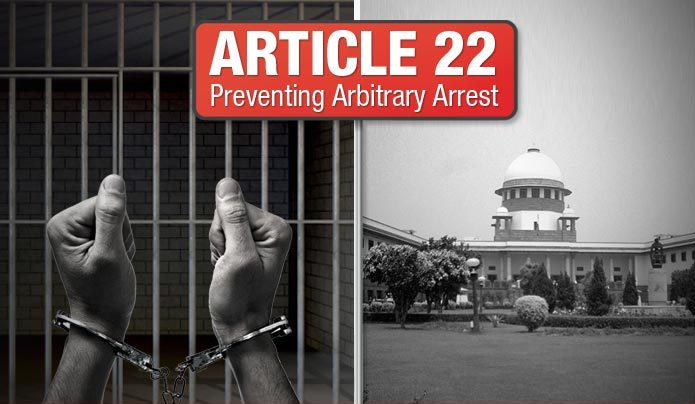Description

Copyright infringement not intended
Details
- The Supreme Court said that “Preventive detention laws in India are a colonial legacy with a high potential for abuse and exploitation by the state”.
Preventive Detention
- It is a legal measure that allows the state to detain a person without trial for a certain period, on the grounds of preventing them from committing a future crime or endangering national security.
- It is often invoked in situations of emergency, war, terrorism, or public disorder.
- It may seem like a necessary and effective tool to deal with potential threats, but it also poses serious challenges to human rights and the rule of law.
- Preventive detention laws in India are derived from the Constitution, which empowers the Parliament to make such laws under Article 22.
Concern
- It can be abused by the authorities to silence dissent, target minorities, or bypass due process.
- It can also lead to arbitrary and indefinite detention, torture, and other forms of ill-treatment.
- Therefore the law must be regulated by clear and strict criteria, safeguards, and oversight mechanisms.

Some steps to regulate preventative detention
Necessity
- Preventive detention should only be used as a last resort when there is no other less intrusive measure available to prevent a serious and imminent threat.
Proportionality
- Preventive detention should be proportional to the nature and gravity of the threat, and should not exceed the duration that is strictly necessary to prevent it.
Legality
- Preventive detention should be based on a clear and specific legal framework that defines the grounds, procedures, and limits of preventive detention.
- It should also comply with international human rights standards and obligations.
Accountability
- Preventive detention should be subject to judicial review and independent oversight.
- The detained person should have access to legal counsel, medical care, and family contact.
- The detained person should also have the right to challenge the legality and necessity of their detention before a court or other competent authority.
Transparency
- Preventive detention should be reported and monitored by relevant bodies, such as parliament, human rights institutions, or civil society organizations.
- The state should also provide accurate and timely information on the number, identity, location, and status of persons under preventive detention.

Way Forward
- Preventive detention is a serious measure that should only be employed in extreme cases and compliance with constitutional principles and human rights norms.
- It is important to regulate preventive detention laws to ensure that they are not used for political or personal revenge and that they respect the detainees' dignity and rights.
Must Read Articles:
Preventive Detention: https://www.iasgyan.in/daily-current-affairs/preventive-detention-21#:~:text=Preventive%20detention%20is%20the%20act,personal%20liberty%20and%20fundamental%20rights.
Police Custody: https://www.iasgyan.in/daily-current-affairs/law-on-police-custody
|
PRACTICE QUESTION
Q. Preventive detention is a controversial practice that allows the state to detain individuals without trial for security reasons. It raises serious questions about the protection of human rights and the rule of law. How can we ensure that preventive detention is used only as a last resort and with adequate safeguards? What are the best practices and standards for regulating preventive detention in a democratic society?
|

https://www.hindustantimes.com/india-news/supreme-court-of-india-warns-%20against-abuse-of-preventive-detention-laws-says-slightest-procedural-error-must-favor-%20detenue-cofeposa-civilliberties-101681270302764.html











